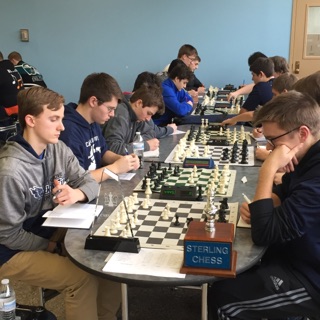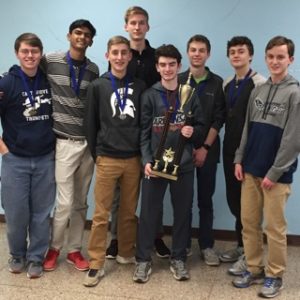Downstate checkmate

Cary-Grove students are involved in many different activities, but recently it has been the chess team that deserves the limelight. Several weeks ago the varsity team, consisting of eight players, took first place in the Northern Illinois Chess League (NICL), out of sixteen teams, with JV coming in at third place.
Winning conference is something of a tradition for the team. Four years in a row they have been NICL champions. Because of this, the team focuses less on winning, and more on making it an enjoyable experience.
“It’s a little less stressful because you know that you’re kind of going to state, so it’s mostly just fun,” said junior Riley Conroy, who plays at Board 4.
“Conference was a pretty good experience,” said junior Joseph Jazwinski, who plays at Board 3. “I won three and drew one, and as a team we won all the games, so overall it was really positive.”
“We’re the best team in our conference, so it wasn’t too much of a challenge. It was just about going and having fun and playing chess,” said senior Shawn Flesher, who plays at Board 2.
“Going back-to-back for conference champs has always been a good thing, and I hope that the juniors, their senior year, can go for the three-peat,” said Board 7 senior Michael Hawker. “I think that’d be really cool.”
Despite the team winning with ease, personal struggles do, at times, get in the way.
“Conference was interesting. I didn’t get much sleep the night before and then I had to play chess the day after, all day, and then I got sick,” said junior Matt Mazek, who plays at Board 8. “But you know, it was still fun, 4-0. It was a good time.”
By once again winning conference, the team then advanced to the state competition, which was held in Peoria from February 10th through the 12th. In this competition, around 150 competitive high school chess teams from around the state of Illinois were in attendance. Despite this distinguished honor, special preparation was not necessarily in order.
“We don’t really cram study,” Flesher said. “We’ve been preparing for state for years. It’s kind of like preparing for a sports match, like you wouldn’t just try to lift like 100 pound weights the week before. You would slowly build up your strategy and your tactics over years. I know we’ve all been playing for at least 5 years preparing for competitive chess.”
That being said, they are always practicing, whether it be by research and studying variations of moves, practicing online, or simply playing chess.
“Sometimes you can research chess, as weird as that sounds. There’s a lot of different openings, a lot of different variations that can happen,” Hawker said. “Sometimes there are times where you have to think 10 moves ahead and about all the different variations that can happen, and they can be hundreds.”
“We play a lot of chess.com, it’s like an app or a site where you play games,” said junior Anang Vedantham, who plays at Board 6. “Plus, we annotate games, so we go over past games to see how we did and improve from there. It’s kind of like in football they go over videos of how they play, and also they go over different formations. In chess there’s like different openings, different moves you can do to start off the game, so that’s kind of like a formation for us.”
Team adviser Dr. Chianakas also emphasized the team helping and teaching each other to become better, which is probably where they improve most.
“We also practice with the team a lot, like on the bus we played a lot of chess. Our ‘Board 1’ Jason Drews, he helps us a lot because he’s smart, he’s really good, so he helps us on moves,” Vedantham said.
“Two minds are better than one,” Mazek said.
At State, the team encountered many challenges, as well as many successes.
“It was a lot of fun because all the kids are my friends, the coach bus was amazing, but the playing, I did good, but it was really exhausting, and I felt like I could’ve done more. There was some kind of stupid things that I did that I regretted immediately,” said Jazwinski.
State was great for me, but I’m kind of sad because I was so close to a medal, but didn’t get one, I was like 5 points off, but it was also really fun, I really loved it,” said Vedantham.
“We placed in the top 20%. I mean, I feel like we were all a bit disappointed because conference went really well and this is one of the best teams we’ve had in a decade maybe–maybe five years, and we all felt like we could’ve placed much higher, but we got some bad luck, we made some blunders, but overall we did pretty well when you take into consideration the size of the school,” said Flesher. “We placed 39th overall out of [150]. In the first day I think we got up to eighth and then we started losing. We lost a couple rounds, dropped down to like the 50th, and then won the last round to go up to 39th.”
One such blunder included what one could consider foul play. In chess there are many different and specific rules a player has to consider and be aware of. One such rule is that if your opponent says the word draw, you can accept the draw, which can be compared to a “cat’s game” in tic-tac-toe, and can be the difference between a win and a loss.
“Our player was losing the game, and he was one move away from losing and he only had 10 seconds left on his clock and he asked his opponent ‘what’s it called when it’s not a win and it’s not a loss?’ and his opponent said ‘a draw?’ and so he accepted the draw,” said Flesher. But as the Cary-Grove students they are, they gave their opponent the point, realizing how unsportsmanlike it was, as it was a form of deception.
“There were a few things that happened that are questionable, but it is what it is,” said Conroy.
Some of the bad luck Flesher had mentioned was a bad call by the ref against Cary-Grove. Another rule of chess is that you cannot talk to teammates or coaches during a game because of the possibility of cheating.
“I was playing and it was coming down to time pressure, I only had one second left with a five delay and my opponent got up and he started talking to his teammates and so I called the ref over because i wanted to get a penalty out of it so that i would have better winning chances,” Flesher said. Because it was one team’s word against another, the ref did not call a penalty.
“Sometimes the refs rule in their favor, sometimes they don’t, but it was still fun,” he said.
For some, the state competition was the defining moment of their competitive high school chess careers.
“My experience with state was, it being the last one, it felt like there was a lot more passion in it, especially with my final match, because it’s the last game of my high school career, and there’s a lot more pressure, especially because our team does so well, and we know what we’re capable of,” Hawker said.
Overall, the members of Cary-Grove’s competitive chess team do it to have a good time.
“I think having fun should be the number one objective,” Jazwinski said. “If it wasn’t fun, I definitely wouldn’t do it, but I feel like we could’ve taken steps to do better as a team.
“You would think that like, chess gets boring after a while, like after you play it for 2 days straight, but it just doesn’t, like I can’t really explain it, it’s just fun,” Mazek said.
With the competitive season over, the chess team continues to meet on Mondays and Wednesdays to build skills and friendships, and apply what they have learned from playing chess in their everyday lives.
“It’s helped me just to slow down and think things out,” Flesher said. “I remember as a freshman I was pretty impatient and I wouldn’t really think things through, but after years of playing chess it got me to slow down and look at problems from all angles and just think things out.”
“Well, I think that a lot of times people think that like chess is kind of one of those things that not a lot of people do, or only a certain type of people do, but I mean we have people who play football, there are people who play soccer, et cetera,” Hawker said. “Even though our whole school is mixed and integrated with everything, I think that we just have a lot of people who you think wouldn’t be interested in chess, that actually are interested in it, and it’s just a part of the community.”
Through hard work, and game after game after game, the team has proven their stature as well as character.
“It’s a great group of boys,” Dr. Chianakas said with a smile.
